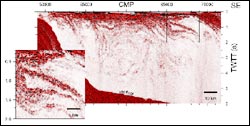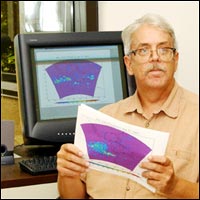A paper in Nature today (14 August) reveals that certain ocean viruses invade the cells of cyanobacteria (known as blue-green algae) and use the energy the cells produce through photosynthesis for their own purposes.
Researchers at the University of Warwick, led by Professor Nick Mann, have shown that when the viruses infect the bacteria they inject their genetic material into their host, a transfer that may be temporarily advantageous to the host.
Part of the injected DNA codes fo
The world’s smallest photosynthetic organisms, microbes that can turn sunlight and carbon dioxide into living biomass, will be in the limelight next week. Three international teams of scientists, two funded in part by the National Science Foundation (NSF), will announce the genetic blueprints for four closely related forms of these organisms, which dominate the phytoplankton, the tiny floating plants of the oceans. The work will be reported in the August 13 online issues of Nature and t
Hundreds of species with small ranges seen vulnerable
The Caribbean Sea has the greatest concentration of marine life in the entire Atlantic and is home to hundreds of species that live only in precariously small areas, making life there far richer and more delicate than previously thought, according to a new study.
An analysis of the ranges of 1,172 marine species revealed that some 253, or 22 percent, are endemic to the Caribbean region, meaning they are found nowhere else

A new application of a decades-old technique to study Earth´s interior is allowing scientists “see” the layers in the ocean, providing new insight on the structure of ocean currents, eddies and mixing processes. The findings, reported in this week´s Science by a team from the University of Wyoming and Woods Hole Oceanographic Institution (WHOI), could be a major step forward in the ability to remotely survey the interior of the ocean.
The study reports on a new adaptation of seismic

It´s tricky, this weather business — predicting drought, floods, rain or snow, especially months in advance. But NASA scientists at the National Space Science and Technology Center in Huntsville, Ala., are working to take the guesswork out of long-term prediction.
“We´re researching methods to predict precipitation a season or more in advance,” said Dr. Bob Oglesby, a senior atmospheric scientist at the research center. The key, he said, is understanding how the atmosphere interacts with th
High-level delegates from 30 countries and 22 international organisations agreed at the Earth Observation Summit held last Thursday in Washington to improve cooperation on Earth observation and to remove barriers to the exchange of information between countries and organisations.
ESA already carries out its Earth observation programmes in cooperation with other agencies or countries through mechanisms such as CEOS, the Committee of Earth Observation Satellites and IGOS-P, the Integrated Glo